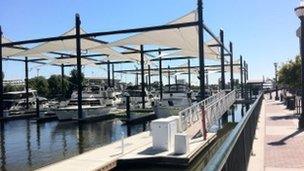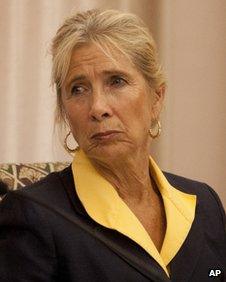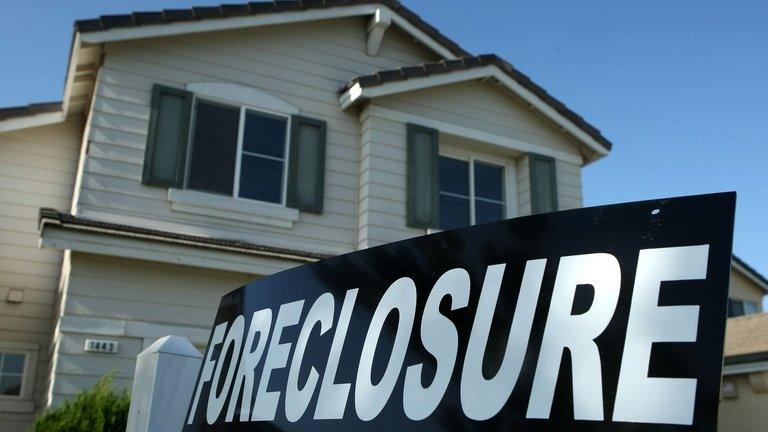Debt and defiance in bankrupt Stockton, California
- Published
- comments
Stockton, California has been forced to slash its police force even as crime rates have soared
From behind the wheel of her black and white patrol car, Sgt Katherine Nance points out a modest house behind a white picket fence.
It was built by her parents, and was where she grew up until she was a young teenager. "It was a good middle-class area," she says wistfully.
She says she rode around on her bike, babysat for the neighbours. Now the local park has become a haven for drug-dealers and a venue for gun fights. You wouldn't let a child walk around here, even during the day.
You might think this is the sort of change has come to many areas, and that it has been happening for years, all across America, for many reasons. Maybe.
But Stockton is part of a new trend: American cities that have gone broke and declared themselves bankrupt.
For Sergeant Nance, crime has spiralled upwards and her old neighbourhood spiralled downwards because of bad choices made by politicians. While you can't get away with murder in Stockton, it sometimes seems to residents you can get away with everything else.
'Most miserable city'
The former river port bloomed during California's first boom, the 19th Century gold rush, and Stockton has seen ups and downs over the years. But the recent economic crisis seemed to change everything.
Stockton recently became the largest city in the US to declare bankruptcy, but along the road to ruin also earned the title of "America's most miserable city".

Stockton is a city of contrasts - from an empty and boarded-up Main Street to a gleaming marina
Stockton has an unemployment rate twice the national average and jostles with many other places for the unenviable sobriquet of "America's murder capital".
Amid all these problems, it is crime and the sense of growing vulnerability that dominates the conversation of locals.
Sgt Nance clearly relishes her job as leader of a community response team. Their main role seems to be to disrupt the many gangs battling it out for control of the city streets.
We hear sirens nearby. Then she gets a message that her colleagues, in an unmarked vehicle, are in hot pursuit.
When we get there a young man with a wispy moustache and a sullen look is sitting handcuffed. He had accelerated away when they tried to stop him for speeding.
When they do stop him, a search reveals several bags of marijuana, a small rock of crack cocaine and a semi-automatic pistol.
There aren't as many officers on the streets as there once were. Police numbers have been cut by one-third, and police pay has been cut by up to 30%, those with the longest service losing the most.
Not surprisingly many officers have left. But it's not only that.

Stockton Mayor Ann Johnson says the city will rise again
The city can't afford to prosecute many offences. Many of those arrested have been let out of jail early. Sgt Nance feels this failure to disrupt petty crime often means criminals are at large, able to do something more serious.
Residents complain that the police won't investigate house burglaries and car thefts.
She agrees that for the most part, they don't have the resources to follow-up.
Many of the areas where I am taken don't look particularly bad: just row of after row of shotgun housing, some cared for with loving pride, others more dilapidated.
But Stockton is a city of very visible contrasts. Main Street is a horror: there are whole rows of boarded-up shops, and doors behind heavy bars and grills, pad-locked shut.
It is empty except for the occasional homeless man or woman walking nonchalantly down the street, clutching everything they own.
Less than a mile away, by the waterfront, multi-million dollar yachts idle in the marina, gleaming white, shaded from the sun by rows of white canvas awnings, the very picture of California dreaming.
But the half-empty marina has turned out to be a bit of a nightmare for Stockton.
Like the city's other prestigious projects - the ballpark, a sports stadium and hotels - what once must have seemed like smart regeneration turned out to be a pointless burden as the recession hit home.
Equally, what once seemed like decent treatment for city workers, i.e. generous health care, pensions and pay, particularly for firefighters and police, is now seen as absurd featherbedding.
Lost benefits
I meet the mayor, Ann Johnston, in her balloon shop. We can't go to city hall; it is closed one day a week to save money.
She says Stockton suffered from a perfect storm. These big projects left the city with no money in the bank, and borrowing expanded. Then the recession struck.
All of the city's money comes from property tax, and as property prices went into freefall, the local government's income was slashed.

One in every 195 Stockton homes filed for foreclosure in May
She says Stockton's latest dramatic move is the solution, not the problem.
Nothing changed the day after the city declared itself bankrupt. Stockton hasn't shut its doors and isn't giving up.
Indeed the bankruptcy is a device to avoid paying creditors and to avoid making even deeper cuts. But many are furious about what has happened. The mayor has faced an angry public meeting where city workers testified to the suffering caused by inept politicians.
She says the city will rise again, but Joanie Anderson is less sure.
Anderson is a former police dispatcher, and her husband used to be a policeman. They are both retired, but as they are well under 65, they rely on the city for their health insurance.
It is hugely important to them, but now their programme has been cut from the city budget.
"Our 18-year-old daughter has had four open heart surgeries since birth," she said. "Her last one was this February."
"So she has ongoing health needs that have to be put to the forefront in our family. If she has an emergency that involves her heart, it costs tens of thousands of dollars in the hospital."
But it would cost them $34,000 (£22,000) to replace their healthcare, if indeed any insurance company would take them on. They simply can not afford it and have no idea what to do.
Other city workers may have less dramatic stories, but find themselves in the same plight - they thought they had excellent healthcare, and now find themselves with none.
Stockton's descent into insecurity is chilling because it is not an isolated example.
As I left the city, news came that another California town, Mammoth Lakes, had filed for bankruptcy. And beyond each individual town, America itself is deep in the red.
Putting that right may mean as many difficult choices and as much pain.
- Published27 June 2012

